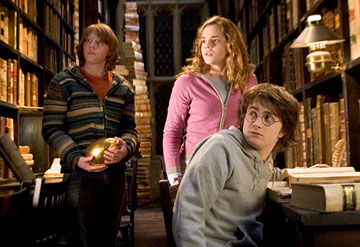Where Art Thou, Harry?
Now Playing: Elgar: The Spirit of England
Topic: Grunts, rants, and others
Sequels, in the desperate world of Hollywood, are always problematic. No matter how good the continued story, or how excellent the actors, the director, or even the finances: in comparison flaws will most likely outweigh the positive. The few times where the new movie is a truly inevitable consequence of its predecessors, the harsh light of the critics will shine so much brighter. Among the recent attempts the most noted failure was The Matrix. Expectations ran high after the initial success; too high for even the most dedicated efforts. Matrix Reloaded thus was a mere shadow of the original, and what was supposed to be the ultimate climax, Matrix Revolutions, offered little more than an exaggerated rehash of the first installment. George Lucas' Star Wars Prequels fared little better - despite (or perhaps even because of) the availability of masterful special effects the execution fell flat; bad acting of the central protagonist only exaggerated this.
In the most noted, and perhaps thus far only successful trilogy, The Lord of The Rings, Peter Jackson avoided the natural pitfalls by almost enslaving his crew for the three years it took to film all of the three movies. He thus achieved a level of consistency and continuation unheard of before. Without wanting to diminish his achievement, it has to be said that he had one advantage few had before him: the basis of the trilogy, J. R. R. Tolkien's books, were not only available, but so detailed one might almost imagine the author had written them with Mr. Jackson in mind.
The thus far four different directors taking potshots at Harry Potter have not been so lucky. Although Ms. Rowlands, the author of the immensely popular books, cannot be faulted on continuity, only one of the four efforts can thus far claim critical success: the third installment, Harry Potter and the Prisoner of Azkaban, directed by Alfonso Cuaron. By the time the extremely talented Mexican director arrived, three other directors had already fiddled with the material (Chris Columbus, Robert Legato, and David Richard Ellis worked on the first Potter film, Chris Columbus alone directed the second).
 The latest installment, Harry Potter and the Goblet of Fire, manages to stay true to the 700+ page book, but that is about all that can be said about it. Although two hours and thirty minutes in duration, the direction and editing are reminiscent of a made-for-TV movie on Channel Four. Perhaps Warner Bros. initial idea to serve the book up as two movies, a la Kill Bill I and II, might have been a better approach. What I fail to understand is why Mr. Cuaron was not asked back (he is in the running for the fifth installment, The Order of the Phoenix), especially in light of the universal acclaim his version of Harry received. Mike Newell may be well suited for Four Weddings And A Funeral and similar romantic fare, but when it comes to directing Harry and his magical peers and superiors, he fails utterly. Nor did he help matters by bringing Mick Audsley in as the editor, whose last success was Terry Gilliam's Twelve Monkeys.
The latest installment, Harry Potter and the Goblet of Fire, manages to stay true to the 700+ page book, but that is about all that can be said about it. Although two hours and thirty minutes in duration, the direction and editing are reminiscent of a made-for-TV movie on Channel Four. Perhaps Warner Bros. initial idea to serve the book up as two movies, a la Kill Bill I and II, might have been a better approach. What I fail to understand is why Mr. Cuaron was not asked back (he is in the running for the fifth installment, The Order of the Phoenix), especially in light of the universal acclaim his version of Harry received. Mike Newell may be well suited for Four Weddings And A Funeral and similar romantic fare, but when it comes to directing Harry and his magical peers and superiors, he fails utterly. Nor did he help matters by bringing Mick Audsley in as the editor, whose last success was Terry Gilliam's Twelve Monkeys.
Of course, the true fans won't mind a bit. Those dedicated to the subject matter, Harry (and to no small amount Daniel Radcliffe) are lining up everywhere, to the tune of over a $ 100 million during the initial weekend release. Only goes to show you: once you get the title right some sequels will succeed, no matter what.
Posted by DocRorlach
at 00:29 CET


 The latest installment,
The latest installment,